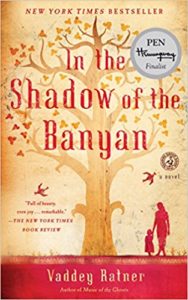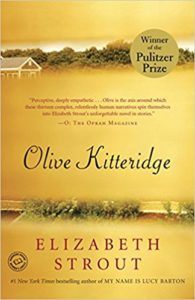 In the Shadow of the Banyan by Vaddey Ratner
In the Shadow of the Banyan by Vaddey Ratner on September 1st 2012
Pages: 322
Buy on Amazon
Goodreads

A beautiful celebration of the power of hope, this New York Times bestselling novel tells the story of a girl who comes of age during the Cambodian genocide.
You are about to read an extraordinary story, a PEN Hemingway Award finalist "rich with history, mythology, folklore, language and emotion." It will take you to the very depths of despair and show you unspeakable horrors. It will reveal a gorgeously rich culture struggling to survive through a furtive bow, a hidden ankle bracelet, fragments of remembered poetry. It will ensure that the world never forgets the atrocities committed by the Khmer Rouge regime in the Cambodian killing fields between 1975 and 1979, when an estimated two million people lost their lives. It will give you hope, and it will confirm the power of storytelling to lift us up and help us not only survive but transcend suffering, cruelty, and loss.
For seven-year-old Raami, the shattering end of childhood begins with the footsteps of her father returning home in the early dawn hours, bringing details of the civil war that has overwhelmed the streets of Phnom Penh, Cambodia’s capital. Soon the family’s world of carefully guarded royal privilege is swept up in the chaos of revolution and forced exodus. Over the next four years, as the Khmer Rouge attempts to strip the population of every shred of individual identity, Raami clings to the only remaining vestige of her childhood—the mythical legends and poems told to her by her father. In a climate of systematic violence where memory is sickness and justification for execution, Raami fights for her improbable survival. Displaying the author’s extraordinary gift for language, In the Shadow of the Banyan is a brilliantly wrought tale of human resilience.
In the Shadow of the Banyan is a moving debut. Ratner is a survivor of the Cambodian genocide of the late 1970’s and later came to America. She says in her author’s note that this novel is her own story with some details compressed or changed. It’s quite a lyrical and moving account of the horrific story of the Cambodian Killing Fields from the viewpoint of a child.
Where the novel suffers, if it does, is the focus. Ratner explains she wanted to show us Cambodia as it was before its destruction at the hands of the Khmer Rouge, but as a result, the novel takes a while to get going. The bulk of the first half is devoted to the first few days and weeks after the Khmer Rouge sends citizens of Phnom Penh into the countryside, and the last several years are compressed. For example, in an interview in the back of the book, Ratner says her journey escaping to Thailand was more fraught and would rate a book in itself. While I wasn’t looking for the worst of the story at the expense of fonder memories, it felt a bit of a cheat to magnify some events at the expense of others that might have been more compelling. As a result, the novel feels uneven; however, as a debut, it’s quite powerful with some poetic moments and beautiful storytelling as well as an emphasis on the importance of living and telling your story.
I read this book for several reading challenges:

 Due to its late 1970’s setting in Cambodia, this novel counts for the Historical Fiction Challenge. It’s also my third country stop for the Literary Voyage Around the World Challenge. As I enjoyed several cups of tea, mostly Bigelow’s Constant Comment and at least one cup of Simpson & Vail’s Jane Austen Black Tea Blend, it also qualifies for the Share-a-Tea Challenge.
Due to its late 1970’s setting in Cambodia, this novel counts for the Historical Fiction Challenge. It’s also my third country stop for the Literary Voyage Around the World Challenge. As I enjoyed several cups of tea, mostly Bigelow’s Constant Comment and at least one cup of Simpson & Vail’s Jane Austen Black Tea Blend, it also qualifies for the Share-a-Tea Challenge.
 Olive Kitteridge by
Olive Kitteridge by 
